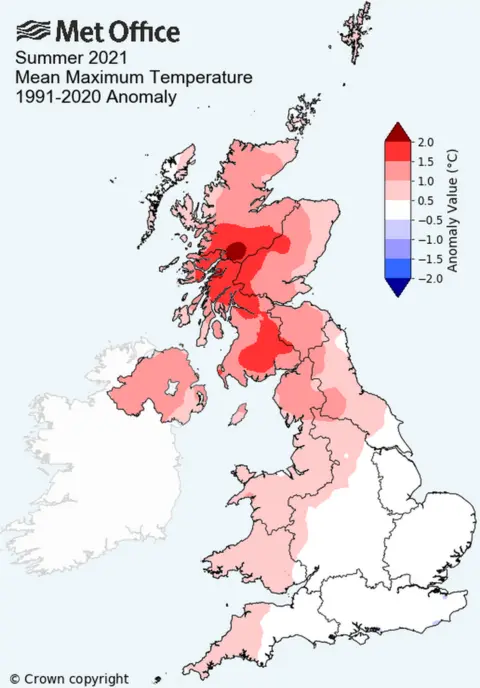Should Scotland be worried about heatwaves?
 PA Media
PA MediaIt was expected that Scotland would dodge the extreme heat forecast for England and Wales - yet the amber alert has crept north of the border.
The Met Office warning means there could be danger to life or potential serious illness and meteorologists have warned there could be record breaking temperatures.
But that said, we are still experiencing a less severe heatwave compared to our southern neighbours where an unprecedented red extreme heat warning has been issued.
This, perhaps, is nothing new. Scotland has always been colder and wetter on average than England - but is the gap changing?
Meteorologists say, not exactly - but the latest conditions could be due to warmer air "spilling" further north when there is a heatwave in places like France, Spain and North Africa.
BBC Scotland weather forecaster Joy Dunlop said this was the simple explanation for more extreme weather further south.
Last week, she said there was high pressure in the south which keeps conditions solid and settled, but Scotland experienced a series of weather fronts coming in from the west, which bring cloud and rain from the Arctic.
On Monday and Tuesday, she said, Scotland would experience warmer weather as the hot air travels higher towards the central belt - however, there still would be a difference of around 20C between the northern isles and the hottest parts of England.
Allow X content?
Should Scotland prepare for heatwaves?
As a result of the recent spikes in temperature, scientists from The Physiological Society - whose focus is to understand how the body works - have called for heatwaves to be named just like storms.
They say this will help communicate the severity of forecasts and help people understand how to protect themselves from extreme heat - particularly the elderly and young children who are more vulnerable.
The measure has recently been introduced for the first time in the Spanish city Seville - and is necessary because heatwaves are becoming more widespread and kill more people than storms do, the scientists added.
Mike Tipton, the society's group co-ordinator, said although Scotland is not affected by heatwaves now, this will change over time - and people should be prepared.
 Reuters
ReutersHe said: "The likelihood is that these will spread over more of the UK. Also, you've got plenty of people travelling through Scotland - particularly in the months to come - on holiday in regions that will be really very warm to the point where they're life threatening for some individuals, particularly the elderly and young children."
Mr Tipton added that people with fair skin are also among the most susceptible to sunburn, adding: "It's not something that countries that are not currently being impacted by heat shouldn't worry about."
BBC Scotland forecast Joy Dunlop added: "As the world is getting warmer, the likelihood of heatwaves increases. We need to be prepared for this - understanding how they affect both people and infrastructure is a huge part of dealing with the issue.
"With Scotland being further away from the continent / Sahara, the likelihood of us getting this extreme heat is lower. but it doesn't mean that we shouldn't prepare for conditions that for us, are hotter than normal, as substantial changes in working practices and daily routines may to be required."
Is the UK getting hotter?
Britain has been slowly getting warmer since the 19th Century. In the past three decades, the UK has become 0.9C warmer.
The 10 hottest years since 1884 have all happened since 2002. And none of the coldest years has been recorded this century.

It is not possible for meteorologists to tie single weather events such as the current heatwave to climate change.
But experts are in no doubt that climate change is causing global temperatures to rise.
This has brought more extreme weather, including record-breaking high temperatures across the world.
But periods of intense heat do occur within natural weather patterns.
The temperatures of 36C in England would be an all-time record in Scotland, where the record is currently the 32.9C recorded at Greycrook in the Borders in 2003.
Scotland has also recorded some extremely high summer temperatures in recent years.

Last summer, for example, much of Scotland enjoyed warmer conditions than the south east of England, when compared with the average temperatures over the last 30 years.
But it is also important to note that all four seasons have seen warmer average temperatures in the past decade than in the years from 1961 to 1990.
By far the largest changes in average temperature in Scotland over the past 40 years have been seen in the winter.
The average temperatures in England have risen further in the winter and spring than in the summer and autumn.
But the Met Office said that, when taken over the year, Scotland sometimes experiences a greater rise in temperatures than England.
